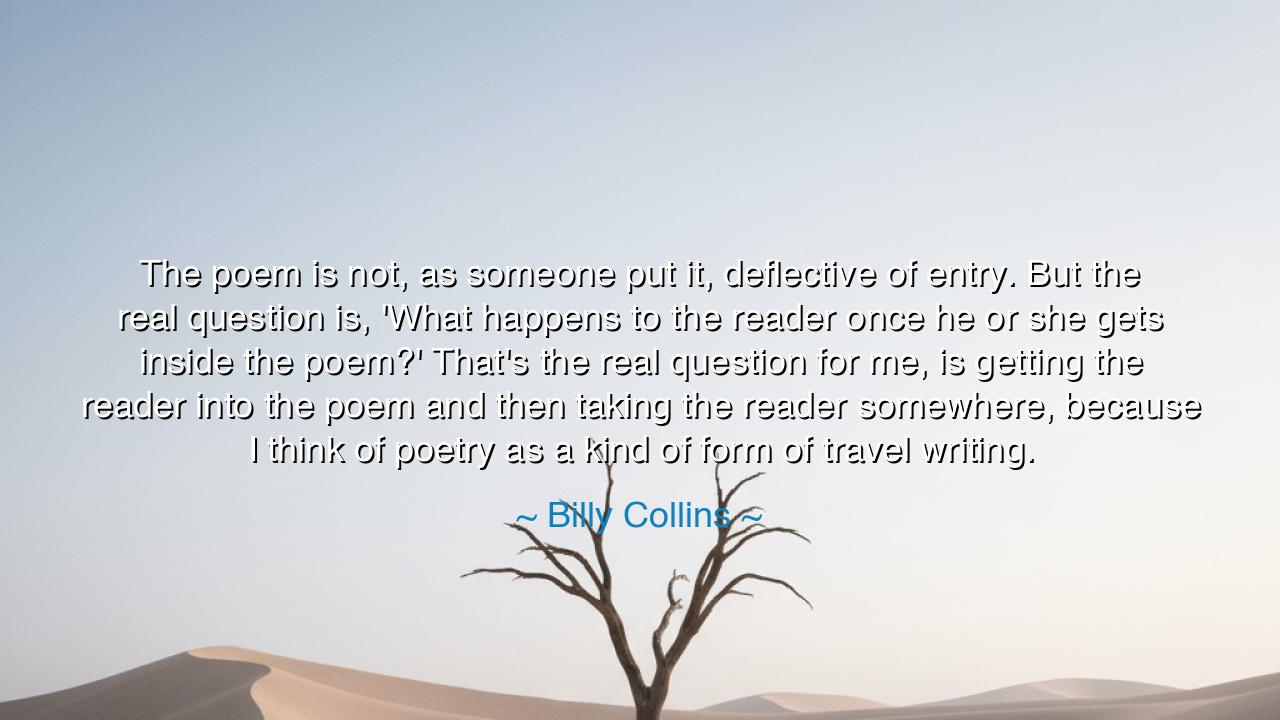
The poem is not, as someone put it, deflective of entry. But the
The poem is not, as someone put it, deflective of entry. But the real question is, 'What happens to the reader once he or she gets inside the poem?' That's the real question for me, is getting the reader into the poem and then taking the reader somewhere, because I think of poetry as a kind of form of travel writing.






Hear, O lovers of words and seekers of wisdom, the voice of Billy Collins, who spoke thus: “The poem is not, as someone put it, deflective of entry. But the real question is, ‘What happens to the reader once he or she gets inside the poem?’ That’s the real question for me, is getting the reader into the poem and then taking the reader somewhere, because I think of poetry as a kind of form of travel writing.” These words, though born of the art of verse, are as profound as any ancient teaching, for they reveal that a poem is not merely to be read but to be lived, not merely a wall of language but a passage into another world.
Too often, men and women have thought of the poem as a fortress, locked away in riddles, guarded by scholars, resistant to the unlearned. Collins rejects this, saying it is not “deflective of entry.” The poem is not a barrier but a door. Its true purpose is not to keep seekers out, but to invite them in. The question is not whether one may enter, but what transformations await once the threshold is crossed.
For once the reader steps into the poem, they are no longer standing in the same place. Like the traveler who boards a ship or mounts a horse, the poem carries them elsewhere—into memory, into wonder, into sorrow, into joy. In this way, Collins likens poetry to travel writing, where the page becomes a landscape, the stanza a path, and the metaphor a guiding star. The poet is not a builder of prisons but a guide, and the poem is not a maze but a journey.
Consider, O listener, the example of Homer’s Odyssey. Though it is called an epic, is it not also a poem of travel? Each verse carries the reader alongside Odysseus—into the caves of Cyclopes, across the seas of Poseidon, into the arms of Calypso, and finally back to the hearth of Ithaca. To read it is not to stand outside the gates of literature, but to be swept away into the adventure. This is the vision Collins proclaims: that every poem, great or small, should take the reader by the hand and transport them.
The meaning of his words is profound: literature is not meant to display its own cleverness, nor to prove the intelligence of the poet, but to move the soul of the reader. The poet must not ask, “Can I dazzle with difficulty?” but instead, “Where will I take the one who follows me?” For the greatest works of art are not monuments to the artist, but pathways for others. The gift of the poet is not the wall, but the journey.
The lesson for you, O child of tomorrow, is this: approach poetry not with fear, as if it were a code to be broken, but with openness, as if it were a voyage to be taken. Let it carry you. Do not worry if every symbol is clear; instead, ask yourself, “Where has this poem taken me? What did I feel when I walked its roads?” For in that question lies the true power of the art.
Practical action follows: when you read a poem, do not stop at its surface. Enter it. Wander its lines as if they were streets of a foreign city. Let yourself be surprised by what you see. And if you are a writer, craft your words not as puzzles to be admired but as doors to be opened. Ask yourself not only what you are saying, but where you are leading. In this way, you honor the ancient calling of the poet: to guide others to places they have never been.
Therefore, remember Collins’ wisdom: the poem is not a fortress, but a voyage. The reader is not a trespasser, but a traveler. And poetry, at its best, is not the hoarding of words, but a form of travel writing, leading us through landscapes of thought and feeling, and returning us transformed. Walk boldly into the poem, and let it take you where you did not know you needed to go.






AAdministratorAdministrator
Welcome, honored guests. Please leave a comment, we will respond soon